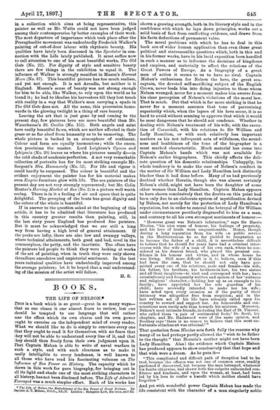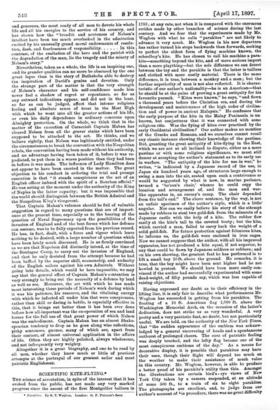BOOKS.
THE LIFE OF NELSON.*
Tnis is a book which is so great—great in so many ways— that as one closes it one almost fears to review, lest one should be tempted to use language that will rather mar the effect which its own charm and its own power ought to exercise on the independent mind of every reader. What we should like to do is simply to convince every one that they ought to read it for themselves, with no fears that they will not be able to understand every line of it, and that :hey should then freely form their own judgment upon it. that Captain Mahan is able to write of naval warfare in such a style, and with such clearness as to make it easily intelligible to every landsman, is well known to all those who have read his fascinating volumes on The fnfiaence of Sea Power on History. The capacity which he shows in this work for pure biography, for bringing out in all its light and shade one of the most striking characters in all history, has not been disclosed before. The Life of Admiral Farragut was a much simpler effort. Each of his works has
• The Lift of Wean the Embodiment of the Sea Power of Great Britain. By ilaptain A. T. Mahan, D.C.L., LL.D. London : Sampson Low, hta-ston, and Co.
shown a growing strength, both in its literary style and in the confidence with which he lays down principles, works out a solid basis of fact from conflicting evidence, and draws from his facts deductions of permanent value.
The moral problems with which he has to deal in this book are of wider human application than even those great political and statesmanlike questions which, both in this and in his former works, have in his lucid exposition been handled in such a manner as to influence the decisions of kingdoms and empires, and materially to affect the relations of the Great Powers of Europe. As a biography of a great man of action it seems to us to have no rival. Captain Mahan's enthusiasm for Nelson the hero, the great sea- captain, the devoted self-sacrificing subject of the English Crown, never leads him into doing injustice to those whom Nelson wronged, never for a moment makes him swerve from his clear perception of Nelson's violations of the moral law.
That is much. But that which is far more striking is that he never for a moment assumes that tone of patronising. superiority which, when the lapses of his hero occur, it is so hard to avoid without seeming to approve that which it would be most dangerous that he should not condemn. Whether in dealing with Nelson's treatment of his wife, with the execu- tion of Caraccioli, with his relations to Sir William and Lady Hamilton, or with such relatively less important matters as his not infrequent acts of wilfulness, the sound- ness and healthiness of the tone of the biographer is a most marked characteristic. Much material has come into
Captain Mahan's hands which was not available for Nelson's earlier biographers. This chiefly affects the deli- cate question of his domestic relationships. Unhappily, it whole tendency is to make the case of Nelson's conduct in the matter of Sir William and Lady Hamilton look distinctly blacker than it had done before. Many of us had previously doubted whether Horatia, though she was almost certainly Nelson's child, might not have been the daughter of some other woman than Lady Hamilton. Captain Mahan appears to have shown conclusively that the doubts on this point had been only due to an elaborate system of mystification devised by Nelson, not merely for the protection of Lady Hamilton's reputation, but in order to conceal the betrayal of Sir William under circumstances peculiarly disgraceful to him as a man, and contrary to all his own strongest sentiments of honour:— "However great was Nelson's infatuation," says Sir Harris Nicolas, " his nice sense of honour, his feelings of propriety, and his love of truth were unquestionable. Hence, though during a long separation from his wife on public service in the Mediterranean he so far yielded to temptation as to become the father of a child, it is nevertheless difficult to believe that he should for years have had a criminal inter- course with the wife of a man of his own rank, whom he con- sidered as his dearest friend, who placed the greatest con- fidence in his honour and virtue, and in whose house he was living. Still more difficult is it to believe, even if this had been the case, that he should not only have per- mitted every one of his relations, male and female—his wife; his father, his brothers, his brothers-in.law, his two sisters and all their daughters—to visit and correspond with her ; have ostentatiously and frequently written and spoken of her 'virtuous and religious' character,—holding her up as an example to his family; have appointed her the sole guardian of his
child; have avowedly intended to make her his wife ; have acted upon every occasion as if the purity of their:
intimacy was altogether free from suspicion; and in the
last written act of his life have solemnly called upon his country to reward and support her. An honourable and con- scientious man rarely acts thus towards his mistress. Moreover, Nelson's most intimate friends, including the Earl of St. Vincent, who called them a pair of sentimental fools,' Dr. Scott, his chaplain, and Mr. liaslewood were of the same opinion, and Southey says 'there is no reason to believe that this most un- fortunate attachment was criminal.' "
That quotation from Nicolas sets forth fully the reasons why many of us had perhaps partly allowed the " wish to be father to the thought" that Horatia's mother might not have been Lady Hamilton_ Alas! the evidence which Captain Mahan
has produced appears to show conclusively that that hope and that wish were a dream. As he puts it— "This complicated and difficult path of deception had to be trod, because the offence was not one of common error, readily pardoned if discovered, but because the man betrayed, whatever his faults otherwise, had shown both the culprits unbounded con- fidence and kindness, and upon the woman, at least, had been led by his love to confer a 1,4nefit which neither should have forgotten " And yet with wonderful power Captain Mahan has made the life consistent with the character of a man singularly noble-
and generous, the most ready of all men to devote his whole life and all his energies to the service of his country, and has shown how the " breadth and acuteness of Nelson's intellect have been too much overlooked in the admiration excited by his unusually grand moral endowments of resolu- tion, dash, and fearlessness of responsibility In this contrast, of the exaltation of the hero and the patriot with the degradation of the man, lie the tragedy and the misery of Nelson's story."
Nevertheless, taken as a whole, the life is an inspiring one, and its grander qualities can no more be obscured by the one great lapse than is the story of Bathsheba able to destroy the inspiration of David's genius and devotion. Only the strange part of the matter is that the very strength of Nelson's character and his self-confidence made him never feel a shadow of regret or repentance, so far as any outward indications appear, and did not in the least, so far as can be judged, affect that intense religions feeling and absolute sense of trust in the Most High with which he went into all the greater actions of his life, or even his daily dependence in ordinary concerns upon Almighty protection. On the whole, we think that in the matter of the execution of Caraccioli Captain Mahan has cleared Nelson from all the graver stains which have been supposed to be attached to the act. He thinks, and we believe rightly, that Nelson was legitimately entitled, under the circumstances, to break the convention with the Neapolitan rebels, the convention having been made without his authority, and no advantage having been taken of it, before it was re- pudiated, to put them in a worse position than they had been in before it was made. The influence of Lady Hamilton does not appear to have been exerted in the matter. The great objection to his conduct in ordering the trial and prompt execution is that " it stands conspicuous as the act of an English officer imbued with the spirit of a Bourbon official." He was acting at the moment under the authority of the King of Naples in the latter capacity; but it was impossible that the world should distinguish between the British Admiral and the Neapolitan King's vicegerent.
That Captain Mahan's volumes should be full of valuable anggestion in regard to many questions that are of import- ance at the present time, especially as to the bearing of the question of Naval Supremacy upon the possibilities of the invasion of England and of the best forms which her defence can assume, was to be fully expected from his previous record. He has, in fact, dealt, with a force and vigour which leave nothing to be desired, with a large number of questions which have been lately much discussed. He is as firmly convinced as we are that Napoleon did distinctly intend, at the time of the Boulogne Camp, to carry out the invasion of England, and that he only desisted from the attempt because he had been baffled by the superior skill, seamanship, and audacity of the English sailors against his own Admirals. Without going into details, which would be here impossible, we may say that the general effect of Captain Mahan's contention is very strongly to bring out the necessity of a defence by land as well as sea. Moreover, the art with which he has made most interesting those periods of Nelson's work during which it was his patience, his resource, and the vitalising energy with which he infected all under him that were conspicuous, rather than skill or daring in battle, is especially effective in this, that it brings out better than it has been ever done before how all-important was the co-operation of sea and land forces for the full use of that great power of which Nelson was the embodiment. Captain Mahan has an almost Shake- spearian tendency to drop as he goes along wise reflections, pithy sentences, gnomes, many of which are, apart from their context, of almost universal application in the affairs of life. Often they are highly polished, always wholesome, and not infrequently very weighty.
Altogether it is a great biography, and one to be read by all men, whether they know much or little of previous attempts at the portrayal of our greatest sailor and most patriotic Englishman.



































 Previous page
Previous page